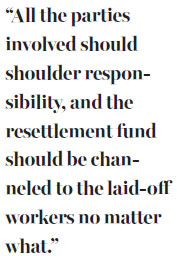Share responsibility to resettle laid-off workers
Updated: 2016-03-25 08:26
By Wang Zeying(China Daily Europe)
|
|||||||||
Yin Weimin, the minister of human resources and social security, has said the central government will spend 100 billion yuan ($15.4 billion; 13.7 billion euros) in the next two years to help resettle 1.8 million laid-off workers in sectors that suffer from overcapacity, such as coal and steel.
This shows that central authorities are determined to reduce overcapacity while helping workers who are affected.
But resettlement should not depend only on this 100 billion yuan allocation. Companies must play the principal role, and local governments should plan and coordinate the entire process.
All the parties involved should shoulder responsibility, and the resettlement fund should be channeled to the laid-off workers no matter what.

Companies should create new posts depending on their existing facilities and the technologies they use, to help workers get new jobs. In this process, enterprises have to take the major responsibility and inject more funds to ensure workers are re-employed, and local authorities should offer preferential policies, funding support and subsidies.
Companies should also use more resources to start targeted training programs for workers likely to be laid off. Local governments should also start re-employment support programs, and expand their special re-employment and unemployment insurance funds.
And to make the entire process effective, the authorities should also strengthen monitoring and supervision of their support programs.
For those workers who will retire within five years and could voluntarily seek early retirement, companies could sign agreements with them to change the labor contracts according to the law. However, enterprises still have to provide a basic living allowance to such workers, and pay their basic pension insurance and medical insurance premiums.
In the case of companies that are likely to close down, they should terminate labor contracts according to the law with employees who are close to retirement age and ensure the resettlement funds are directed to them. As far as workers are concerned, they could choose to get one-time monetary compensation, or receive a basic living allowance from government-appointed organizations until they reach retirement.
During this period, their basic living allowance, pension and medical insurance premiums must be paid by the government-appointed organizations using the enterprises' funds earmarked for the purpose.

Since companies play a big role in reducing overcapacity, they should offer financial compensation to laid-off workers, as well as pay the due salaries and social insurance premiums.
Moreover, local governments should improve their tax and financial policies to help companies reduce overcapacity according to the central government's guideline. The local authorities, for example, could offer rewards to industries that are under huge pressure to resettle laid-off workers, to encourage companies to accomplish the task.
Local governments are responsible for the laid-off workers in terms of social security. They should encourage employees to join social insurance programs, make sure they enjoy the benefit of social insurance and supportive policies, and guarantee the basic living of laid-off workers with financial difficulties.
The central government, too, has responsibilities to fulfill. It should establish special funds, for instance, to guide, support and reward companies that reduce overcapacity through mergers and acquisitions, debt restructuring and bankruptcy liquidation.
Resettlement funds for laid-off workers are aimed at protecting the workers' vital interests, and helping expedite reform and industrial restructuring. Therefore, the responsibilities of companies, the central government and local governments should be clearly demarcated, to prevent one party from passing the buck to another, to motivate all parties to deliver results and raise funds to help laid-off workers.
The author is deputy director of the Social Security Research Institute, Ministry of Human Resources and Social Security. The views do not necessarily reflect those of China Daily.
(China Daily European Weekly 03/25/2016 page12)
Today's Top News
President optimistic for Sino-German cooperation
Info sharing 'is key' as Europe faces terror threat
Uneasy times as Belgium mourns the dead
Belgian bombing suspect still at large: Prosecutor
Belgian media withdraws reports of suspect's arrest
Brussels bombers were brothers El Bakraoui
Chinese citizens in Belgium get help after attack
Europe ramps up security in wake of Brussels attacks
Hot Topics
Lunar probe , China growth forecasts, Emission rules get tougher, China seen through 'colored lens', International board,
Editor's Picks

|

|

|

|

|

|






